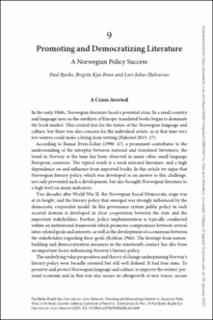Promoting and democratizing literature. A Norwegian policy success
Chapter
Published version
Permanent lenke
https://hdl.handle.net/11250/3042295Utgivelsesdato
2022Metadata
Vis full innførselSamlinger
Originalversjon
de la Porte, C, Eydal, G. B, Kauko, J., Nohrstedt, D., t'Hart, P. & Tranøy, B. S. (eds.) (2022). Successful Public Policy in the Nordic Countries: Cases, Lessons, Challenges. Oxford University Press. https://doi.org/10.1093/oso/9780192856296.003.0009Sammendrag
Norway’s literary policy as a central part of the cultural policy was etablished in the 1960s with the aim to preserve and protect Norwegian language and culture, improve the writers’ economy and thus also secure an aftergrowth of new voices, a stable production infrastructure and—according to library studies—public accessibility to Norwegian literature. The system is among other things based on a purchasing scheme for new Norwegian quality books for public libraries, which provides equal service throughout the country. A VAT-exemption for books contributes to stability and predictability. A library compensation fund compensates authors for income they lose from sales when their books are available in libraries, and a copy compensation fund compensates writers collectively for the use of copyrighted material. The system was originally established for fiction writers. Over the years it has—through extensive political processes—been expanded with a limited number of titles for other genres, most notably non-fiction. All evaluations conclude that it has been highly successful. The main features of the policy have been remarkably stable despite varying governments, due to a largely political consensus on objectives like democratization, free speech and diversity. This does not mean that the system has not been contested. Scholars from the fields of sociology of literature and cultural economics have shown that internationalization and liberalization have gone hand in hand with an enhanced pro-competition stance and that digital distribution contributes to putting the policy under pressure. In later years, the public-management logic has also strengthened its position at the expense of the independence of the field. There is however still robust demand for Norwegian fiction and non-fiction written by award-winning authors as well as new and interesting voices.
